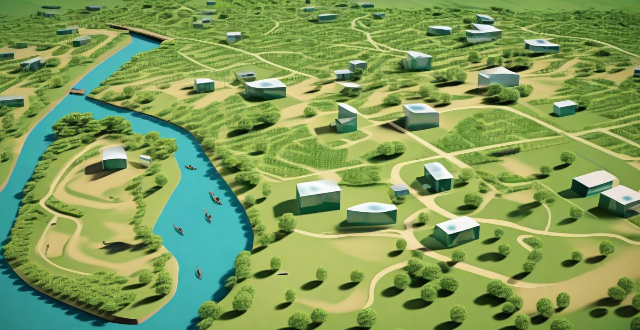Ecosystem services, including provisioning, regulating, cultural, and supporting services, play a vital role in achieving sustainable development goals (SDGs) by providing essential resources for human well-being and economic development while maintaining the health and resilience of natural systems. Provisioning services like food security, clean water, energy, and medicinal resources are crucial for meeting SDGs 2, 6, and 7. Regulating services such as climate regulation, disease regulation, and flood and erosion control contribute to SDGs 13 and 15. Cultural services like recreation and tourism and cultural and spiritual values support SDG 8. Supporting services like soil formation and nutrient cycling and pollination are essential for agriculture and hence SDG 2. The interconnectedness of ecosystem services with other SDGs highlights their importance in building resilient societies that can withstand future challenges such as climate change, environmental degradation, and economic fluctuations. Preserving and enhancing these services is essential for achieving a sustainable future for all.

The Role of Ecosystem Services in Sustainable Development Goals
Ecosystem services are the benefits that humans derive from ecosystems, including provisioning (e.g., food, water), regulating (e.g., climate regulation, flood control), cultural (e.g., recreation, spiritual enrichment), and supporting services (e.g., nutrient cycling, soil formation). These services play a crucial role in achieving sustainable development goals (SDGs) by providing essential resources for human well-being and economic development while maintaining the health and resilience of natural systems.
Provisioning Services
- Food Security (SDG 2): Ecosystems provide food resources through agriculture, fishing, and hunting. Sustainable management of these ecosystems ensures long-term food security without degrading the environment.
- Clean Water (SDG 6): Wetlands, forests, and other ecosystems act as natural filtration systems, purifying water before it reaches rivers, lakes, and aquifers.
- Energy (SDG 7): Renewable energy sources like wind, solar, and hydropower rely on healthy ecosystems to function efficiently.
- Medicinal Resources: Many pharmaceuticals originate from plants and animals found in diverse ecosystems.
Regulating Services
- Climate Regulation (SDG 13): Forests and oceans absorb large amounts of carbon dioxide, helping to mitigate climate change.
- Disease Regulation: Biodiversity in ecosystems can help regulate diseases by reducing pathogen transmission to humans.
- Flood and Erosion Control: Vegetation cover stabilizes soils and reduces the risk of flooding.
Cultural Services
- Recreation and Tourism (SDG 8): Ecotourism relies on intact ecosystems to attract visitors, providing income for local communities.
- Cultural and Spiritual Values: Many cultures have deep connections to specific landscapes or species, which contribute to their identity and well-being.
Supporting Services
- Soil Formation and Nutrient Cycling: Healthy ecosystems maintain fertile soils necessary for agriculture.
- Pollination: Pollinators like bees and butterflies are vital for crop production.
Interconnectedness with Other SDGs
The role of ecosystem services extends beyond individual goals; they are interconnected with multiple SDGs:
- Poverty Reduction (SDG 1): Ecosystem services provide livelihoods for millions of people worldwide.
- Health and Well-being (SDG 3): Clean air, water, and disease regulation all depend on healthy ecosystems.
- Life Below Water (SDG 14) and Life On Land (SDG 15): These goals explicitly focus on conserving and restoring ecosystems to protect biodiversity.
In conclusion, ecosystem services form the foundation upon which many sustainable development goals rest. They are not only critical for addressing specific targets but also for building resilient societies that can withstand future challenges such as climate change, environmental degradation, and economic fluctuations. Preserving and enhancing these services is essential for achieving a sustainable future for all.